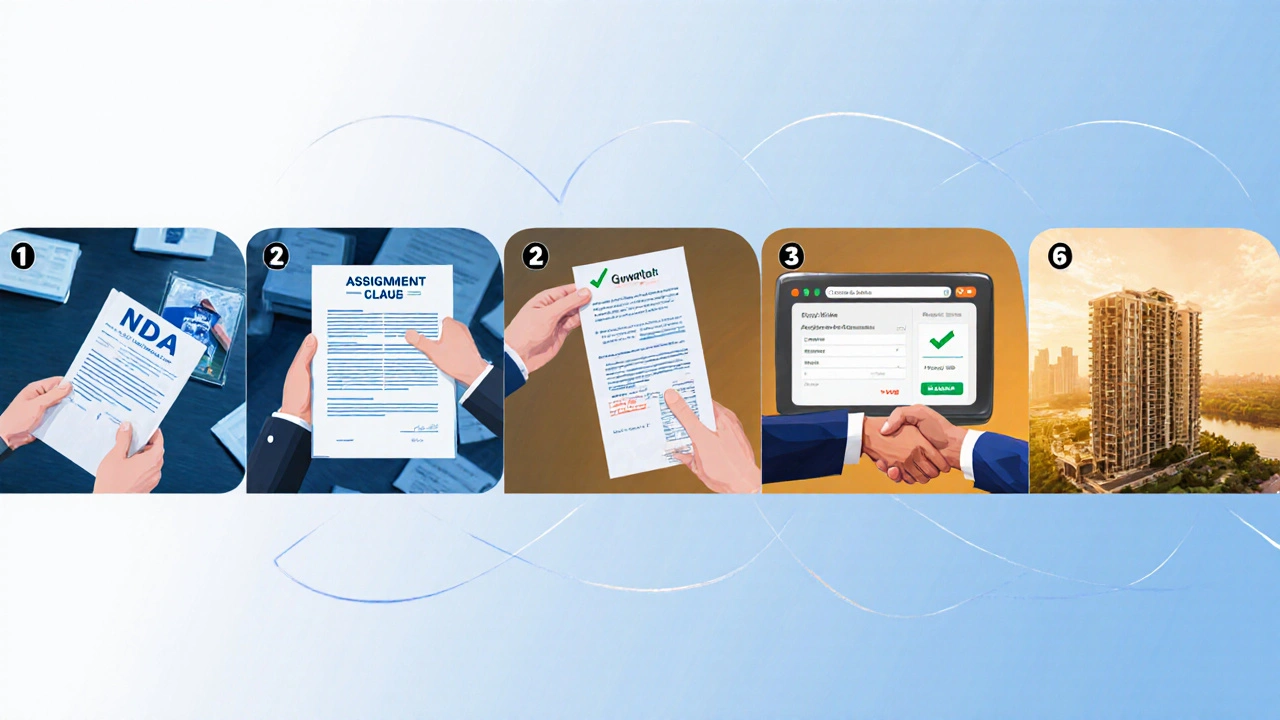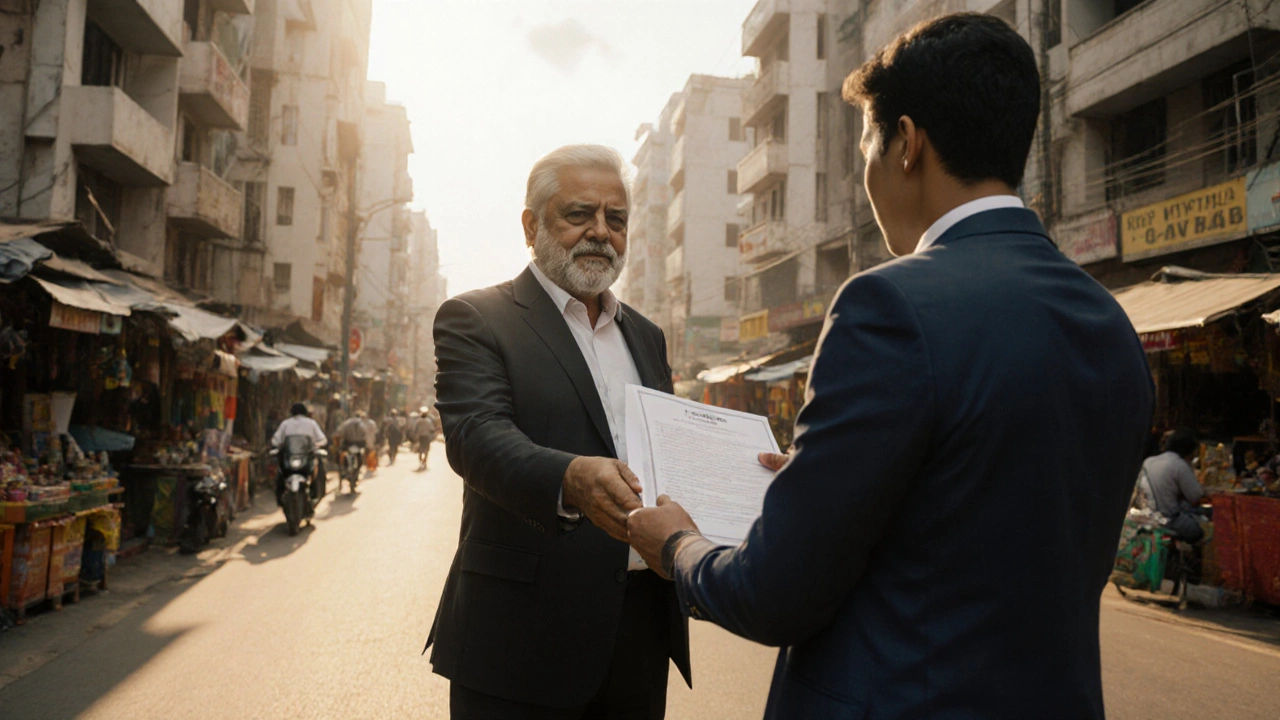Guwahati Wholesaling Profit Calculator
Wholesale Deal Profit Calculator
Calculate potential profit margins for Guwahati real estate wholesale deals based on purchase price, market value, and assignment fee.
Profit Analysis
Enter property details to see profit analysis.
Potential Profit
(Based on market value)
Profit Margin
(Percentage of market value)
Fee Efficiency
(Fee as % of purchase price)
When you hear the term real estate wholesaler Guwahati, you might picture a mystery dealer who flips houses overnight. In reality, wholesaling is a low‑risk way for investors to tap into Guwahati’s booming property market without buying the land themselves. This guide breaks down what a wholesaler does, how the legal landscape looks, and exactly how you can partner with the right local player to secure a profitable deal.
Key Takeaways
- Wholesalers lock up contracts on undervalued properties and assign them to investors for a fee.
- Guwahati’s market has seen a 12% YoY price rise in 2024, making quick turn‑around deals attractive.
- Compliance with Assam’s RERA rules and proper assignment contracts are non‑negotiable.
- Vet wholesalers by checking registration, past deals, and transparent fee structures.
- Follow a six‑step workflow to close a wholesale deal without legal hiccups.
What a Real Estate Wholesaler Actually Does
At its core, a real estate wholesaler is a middle‑man who secures a purchase agreement on a property at a discount, then assigns that contract to an end‑buyer for a pre‑agreed assignment fee. The wholesaler never intends to own the asset; they simply earn by moving the contract.
Think of it as a match‑making service for property owners who need a quick sale and investors looking for below‑market opportunities. The wholesaler’s profit hinges on two things: the size of the discount and the speed of the assignment.
How Wholesaling Works in the Guwahati Market
Guwahati, the capital of Assam, has attracted both NRIs and tech‑industry professionals, pushing demand for residential units, especially 2‑ and 3‑BHK apartments in areas like Pandu and Beltola. According to the Assam Property Index, average unit prices climbed from INR 4,200 per sqft in 2022 to INR 4,800 per sqft in 2024 - a 12% jump.
Wholesalers capitalize on this upward trend by targeting distressed sellers - owners facing loan defaults, inheritance disputes, or urgent relocation. By negotiating a purchase price 10‑15% below current market value, they create a margin that an investor can comfortably absorb while still walking away with a profit after resale.

Finding Reputable Wholesalers in Guwahati
Not every name you see on a Facebook ad is trustworthy. Use these criteria to separate the genuine players from the noise:
- Registration check: Wholesalers should be registered under the Assam Companies Act or as a partnership with a valid PAN. Verify via the MCA portal.
- Track record: Request a list of at least three closed assignments from the last 12 months, including purchase price, assignment fee, and buyer contact.
- Transparency: A clear fee structure (flat INR 2‑5Lakhs or 1‑2% of the contract price) shows professionalism.
- Local presence: Offices in Guwahati’s commercial corridors (e.g., GS Road) are a good sign; remote operators often lack on‑ground verification capability.
- Online reputation: Look for reviews on platforms like Google My Business and real‑estate forums such as Reddit’s r/IndiaRealEstate.
Based on these filters, the following wholesalers have earned consistent positive feedback in 2024‑2025:
- Assam Property Connect - offers a 24‑hour due‑diligence window.
- Guwahati Deal Bridge - specializes in Beltola and Maligaon pockets.
- NorthEast Wholesalers Hub - known for handling heritage property complexities.
Legal and Regulatory Landscape
Wholesaling in India sits at the intersection of contract law and state‑level real‑estate regulations. Here’s what you need to keep straight:
- RERA Assam (Real Estate (Regulation and Development) Act) mandates that any assignment of a sale agreement be registered with the state RERA authority. This provides a safety net against fraudulent transfers.
- The assignment contract must contain:
- Original seller’s details.
- Wholesaler’s assignment fee.
- Buyer's acknowledgement.
- Clear clause stating the wholesaler’s non‑ownership of title.
- GST of 5% applies to the wholesaler’s fee if they are GST‑registered (most are, given the fee size).
- Stamp duty on the assignment is calculated on the ‘consideration’ (i.e., the fee) - typically 0.5% in Assam.
- Ensure the property’s title deed is free of encumbrances. A clean title is a prerequisite for any RERA‑approved assignment.
Failure to comply can lead to a delayed registration, penalties, or even the nullification of the assignment. That’s why a vetted wholesaler will already have a standard RERA‑compliant template ready.
Evaluating a Wholesale Deal - Due Diligence Checklist
Before you hand over any money, run through this checklist. It’s designed to protect both your capital and reputation.
- Verify ownership: Obtain the title deed from the Sub‑Registrar’s office and confirm the seller is the legal owner.
- Check encumbrances: Look for mortgages, liens, or court orders that could hinder transfer.
- Assess market price: Use recent transaction data from Magicbricks or 99acres for the same locality and property type.
- Calculate exit potential: Estimate resale value after a typical 6‑month holding period, factoring in expected appreciation.
- Confirm RERA compliance: Ensure the property is registered under Assam RERA and that the original developer has a valid RERA registration number.
- Scrutinize the assignment fee: Verify it aligns with the market norm (1‑2% of contract price).
- Legal review: Have a local property lawyer review the assignment agreement before signing.

Step‑by‑Step Guide to Close a Wholesale Deal in Guwahati
- Identify a target property: Your wholesaler presents a shortlist. Pick one that matches your risk tolerance.
- Sign a non‑disclosure agreement (NDA): Protect confidential terms.
- Review the original purchase agreement: Ensure it contains a clause allowing assignment without seller’s consent (or that the seller has consented).
- Execute the assignment contract: Both you and the wholesaler sign; the seller signs a consent addendum if required.
- Pay the assignment fee: Transfer via net banking or a demand draft, keeping receipts for GST and stamp duty.
- Register the assignment with RERA Assam: Submit the signed agreement, fee receipts, and identity proofs to the RERA portal.
- Take over the purchase process: Complete any remaining financing and schedule possession with the original seller.
Following these steps keeps the transaction clean, legal, and fast - often within 30‑45 days from first contact.
Common Pitfalls & Pro Tips
- Pitfall: Skipping title verification. Tip: Always request the original title deed and cross‑check with the Sub‑Registrar.
- Pitfall: Ignoring RERA registration. Tip: Use the Assam RERA portal to confirm the project’s registration number.
- Pitfall: Overpaying assignment fees. Tip: Benchmark fees against at least three other wholesalers before signing.
- Pitfall: Assuming all "distressed" sellers are genuine. Tip: Interview the seller directly (or through a trusted lawyer) to understand the urgency.
- Pitfall: Not budgeting for GST and stamp duty. Tip: Add a 6% buffer to your cash‑out estimate.
Wholesaler vs Broker vs Developer - Quick Comparison
| Aspect | Wholesaler | Broker | Developer |
|---|---|---|---|
| Primary Role | Assigns contract for a fee | Facilitates buyer‑seller match, earns commission | Constructs and sells new projects |
| Ownership Risk | None - never takes title | None - no title transfer | High - holds title until sale |
| Typical Fee | INR 2‑5Lakhs or 1‑2% of contract price | 1‑2% of sale price (commission) | Varies - project margin (15‑25%) |
| Regulatory Requirement | RERA‑registered assignment, GST if applicable | RERA registration for agents, GST on commission | RERA project registration, multiple approvals |
| Best For | Investors seeking quick, low‑capital entry | Buyers needing market insight, no urgency | Long‑term investors, end‑users preferring new builds |
Frequently Asked Questions
Is wholesaling legal in Assam?
Yes. Wholesaling is a legitimate business as long as the assignment contract complies with the Assam RERA Act, GST is accounted for, and the property’s title is clear.
How much does a wholesaler charge in Guwahati?
Typical fees range from INR 2Lakhs to INR 5Lakhs, or 1‑2% of the contract price, whichever is higher. Established players may charge a premium for faster closures.
Do I need a lawyer for a wholesale assignment?
While not mandatory, a local property lawyer can review the assignment agreement, verify title documents, and ensure RERA compliance, saving you from costly mistakes.
Can I finance a wholesale deal through a bank?
Most banks treat wholesale assignments like any other purchase. However, you’ll need the original sale agreement, a clear title, and proof of the wholesaler’s assignment fee to qualify for a loan.
What are the tax implications of the assignment fee?
If the wholesaler is GST‑registered, the fee attracts 5% GST. The buyer may claim this as input tax if they are also GST‑registered. Additionally, stamp duty (≈0.5%) is payable on the fee amount.
